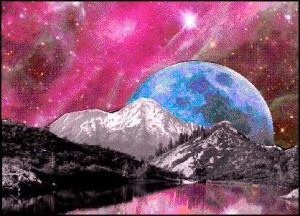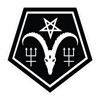by Jake Block
The determination to designate the Hyperborean as the highest degree within the Sect of the Horned God is quite appropriate, in that to reach it, one must find their way into that state of grace within one’s own mind that blesses them with freedom from religion and expectation, allowing them to use their time instead to delve into the inner space of one’s own mind and his personal relationship with all things without.
In The Antichrist (1895), Nietzsche wrote: “Let us face ourselves. We are Hyperboreans; we know very well how far off we live. ‘Neither by land nor by sea will you find the way to the Hyperboreans’—Pindar already knew this about us. Beyond the north, ice, and death—our life, our happiness. We have discovered happiness, we know the way, we have found the exit out of the labyrinth of thousands of years. Who else has found it? Modern man perhaps? ‘I have got lost; I am everything that has got lost,’ sighs modern man. This modernity was our sickness: lazy peace, cowardly compromise, the whole virtuous uncleanliness of the modern Yes and No. … Rather live in the ice than among modern virtues and other south winds! We were intrepid enough, we spared neither ourselves nor others; but for a long time we did not know where to turn with our intrepidity. We became gloomy, we were called fatalists. Our fatum—abundance, tension, the damming of strength. We thirsted for lightning and deeds and were most remote from the happiness of the weakling, ‘resignation.’ In our atmosphere was a thunderstorm; the nature we are became dark—for we saw no way. Formula for our happiness: a Yes, a No, a straight line, a goal.”
Nietzsche was writing about a world of his dreams; one he had not himself made it to, but one to which he aspired. The Hyperborean concept was ancient when Neitzsche adopted it, and its roots can he found in Hellenistic and Platonic legend and lore. The Greeks knew of Hyperborea, as Apollo’s father Zeus came to Mount Olympus on a wonderful chariot drawn by swans from Hyperborea, described by the Greek Historian Hecataeus of Abdera as sometimes an island, “in the far north, “beyond the north wind” and “across the frozen sea.” This land was to be found far to the north of Thrace (the northernmost Greek holding).
It was to this place that Apollo would retreat when the ice and snow of winter gripped Olympus, aboard that same chariot drawn by swans, a gift from his father. And it was during one of his visits to Hyperborea, according to the poet Sappho, that he gave the Hyperboreans laws by which they would be guided, known as the “laws of reason.”
W. Edward Brown, wrote in The Classical Weekly, in his article Some Hellenistic Utopias (1955), “‘The island is fertile and bears all sorts of crops, and is moreover outstanding for its temperate climate; it produces two crops every year . The people themselves are as it were a sort of priests of Apollo.’ ” And in this utopian concept of perfected man, the Hyperboreans have divested themselves of the cares of the world that plague the vast majority, allowing them to turn more toward’s Apollo’s “laws of reason.” The laws of reason were those that favored man’s existence according to human nature, but using one’s intellect to draw benefit from the “baser instincts,” above and beyond mere existence. Harnessing his intellect and overriding raw passions, man could place these forces at the service of the evolution of the earth, by means of his own generative forces. To raise this entire domain and place it under divine laws — not to destroy it. In doing this, the poet Pindar said that Hyperboreans, “don’t get sick or old, don’t have to work or fight. They live in houses close to their temple to Apollo.” Pindar called the Hyperboreans a “sacred race.”
To some, this Hyperborean mindset comes naturally, and they have always been clearer of thought, borne of the knowledge that there is something out there that is neither fish nor fowl… but something in between, and this provides them with sustenance to pursue independent thought and independent living as virtues in a world increasingly stripped of virtue in the quest for mere survival. There have been such thought renegades since the beginning, and while seen as anti-social, or outlaws or “kooks,” these individuals have become the artists, poets, philosophers and other misfits that have carved out a niche in life beyond the herd, where no shepherd is needed, and there are no flocks to follow.
Nietzsche and others pointed the way, and if we are to be worthy of Hyperborea, we must remember that the treasure we seek philosophically will never be found in one chest. No treasure worth having is ever easy to find, and the treasures we find today will surely be surpassed with that of the future, as we increasingly expand our knowledge, our understanding and our innovations to make this the best of all worlds… world without end.
LaVey wrote in The Satanic Bible, Book of Satan V, :
Blessed are the strong, for they shall possess the earth.
Cursed are the weak, for they shall inherit the yoke!
Blessed are the powerful, for they shall be reverenced among men.
Cursed are the feeble, for they shall be blotted out!
Blessed are the bold, for they shall be masters of the world.
Cursed are the righteously humble, for they shall be trodden under cloven hoofs!
Blessed are the victorious, for victory is the basis of right.
Cursed are the vanquished, for they shall be vassals forever!
Blessed are the iron-handed, for the unfit shall flee before them.
Cursed are the poor in spirit, for they shall be spat upon!
Blessed are the death-defiant, for their days shall be long in the land.
Cursed are the gazers toward a richer life beyond the grave, for they shall perish amidst plenty!
Blessed are the destroyers of false hope, for they are the true Messiahs.
Cursed are the god-adorers, for they shall be shorn sheep!
Blessed are the valiant, for they shall obtain great treasure.
Cursed are the believers in good and evil, for they are frightened by shadows!
Blessed are those that believe in what is best for them, for never shall their minds be terrorized.
Cursed are the “lambs of God”, for they shall be bled whiter than snow!
Blessed is the man who has a sprinkling of enemies, for they shall make him a hero.
Cursed is he who doeth good unto others who sneer upon him in return, for he shall be despised!
Blessed are the mighty-minded, for they shall ride the whirlwinds.
Cursed are they who teach lies for truth and truth for lies, for they are an abomination!
Thrice cursed are the weak whose insecurity makes them vile, for they shall serve and suffer!
The angel of self-deceit is camped in the souls of the “righteous”.
The eternal flame of power through joy dwelleth within the flesh of the Satanist!
Let us always strive to the goal of power through joy, armed with knowledge, skill and wisdom borne of will and a lust for life.
“I’d rather laugh with the sinners than cry with the saints; you know that only the good die young.”
Only The Good Die Young — Billy Joel







2 Responses to Into The Hyperborean